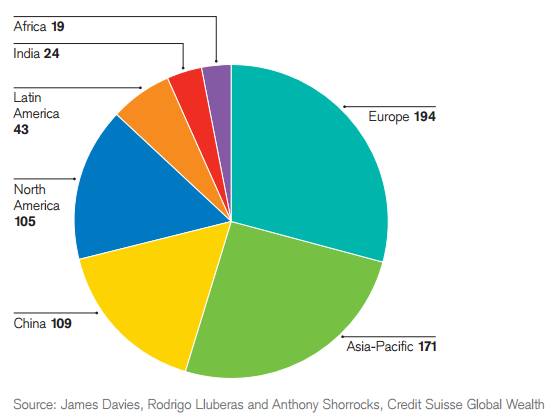Is this the death of America’s middle class?
Stay up to date:
United States
When Barack Obama made his State of the Union speech in January this year, one phrase kept coming up again and again: middle class. The concept is a part of America’s DNA, with many in the country arguing that a strong middle class boosts economic growth and investment.
But fewer Americans than before are identifying as middle class. In 2008, according to research from Pew, 58% of people in the US did. Five years later, that had dropped to 49%.
They might be on to something. This year, according to a new report from Credit Suisse, China’s middle class overtook America’s for the first time, becoming the largest in the world. “The middle class is so closely associated with North America – and the United States in particular – that some of our results for individual countries may come as a surprise,” the report’s authors note.
Here are the numbers of middle-class adults (in millions), by region and country (2015):
Although China has the world’s largest middle class, this social segment still makes up a rather small part of its population: just 10.7%, compared with 37.7% for the US. But while America’s percentage might look good compared with its Asian rival, it is in fact low for a developed country. In Australia, for example, 66.1% of the population are middle class. In the UK that figure stands at 57.4% and in Canada 47.8%.
What’s more, the middle class in China (and Asia more widely) will continue to grow: “The middle class will continue to expand in emerging economies overall, with a lion’s share of that growth to occur in Asia,” the report concluded.
Have you read?
Is your income determined by where you live?
What are the key factors affecting US middle-class incomes?
Is America’s middle class doing better than we think?
Author: Stéphanie Thomson is an editor at World Economic Forum
Image: A US flag flies over the skyline of lower Manhattan in New York. REUTERS/Lucas Jackson
Don't miss any update on this topic
Create a free account and access your personalized content collection with our latest publications and analyses.
License and Republishing
World Economic Forum articles may be republished in accordance with the Creative Commons Attribution-NonCommercial-NoDerivatives 4.0 International Public License, and in accordance with our Terms of Use.
The views expressed in this article are those of the author alone and not the World Economic Forum.
Forum Stories newsletter
Bringing you weekly curated insights and analysis on the global issues that matter.
More on Economic GrowthSee all
Navi Radjou
May 8, 2025
Dave Neiswander
April 28, 2025
Alem Tedeneke
April 25, 2025
Michael Eisenberg and Francesco Starace
April 25, 2025
John Letzing
April 25, 2025
Luis Antonio Ramirez Garcia
April 24, 2025




